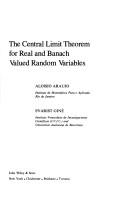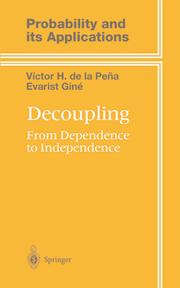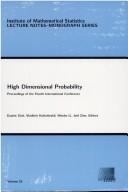| Listing 1 - 10 of 15 | << page >> |
Sort by
|

ISBN: 047105304X 9780471053040 Year: 1980 Publisher: New York, N.Y. Wiley
Abstract | Keywords | Export | Availability | Bookmark
 Loading...
Loading...Choose an application
- Reference Manager
- EndNote
- RefWorks (Direct export to RefWorks)
Probability theory --- Random variables --- Banach spaces. --- Banach spaces --- Central limit theorem --- 519.214 --- Chance variables --- Stochastic variables --- Probabilities --- Variables (Mathematics) --- Asymptotic distribution (Probability theory) --- Limit theorems (Probability theory) --- Functions of complex variables --- Generalized spaces --- Topology --- Limit theorems --- Central limit theorem. --- Random variables. --- 519.214 Limit theorems
Book
ISBN: 9781107043169 9781107337862 1107043166 Year: 2016 Publisher: New York, NY : Cambridge University Press,
Abstract | Keywords | Export | Availability | Bookmark
 Loading...
Loading...Choose an application
- Reference Manager
- EndNote
- RefWorks (Direct export to RefWorks)
Nonparametric statistics --- Function spaces --- Function spaces. --- Nonparametric statistics.
Book
ISBN: 1316443884 1316446891 1107337860 Year: 2016 Publisher: Cambridge : Cambridge University Press,
Abstract | Keywords | Export | Availability | Bookmark
 Loading...
Loading...Choose an application
- Reference Manager
- EndNote
- RefWorks (Direct export to RefWorks)
In nonparametric and high-dimensional statistical models, the classical Gauss-Fisher-Le Cam theory of the optimality of maximum likelihood estimators and Bayesian posterior inference does not apply, and new foundations and ideas have been developed in the past several decades. This book gives a coherent account of the statistical theory in infinite-dimensional parameter spaces. The mathematical foundations include self-contained 'mini-courses' on the theory of Gaussian and empirical processes, on approximation and wavelet theory, and on the basic theory of function spaces. The theory of statistical inference in such models - hypothesis testing, estimation and confidence sets - is then presented within the minimax paradigm of decision theory. This includes the basic theory of convolution kernel and projection estimation, but also Bayesian nonparametrics and nonparametric maximum likelihood estimation. In the final chapter, the theory of adaptive inference in nonparametric models is developed, including Lepski's method, wavelet thresholding, and adaptive inference for self-similar functions.
Book
ISBN: 1009022784 1009022814 Year: 2021 Publisher: Cambridge : Cambridge University Press,
Abstract | Keywords | Export | Availability | Bookmark
 Loading...
Loading...Choose an application
- Reference Manager
- EndNote
- RefWorks (Direct export to RefWorks)
In nonparametric and high-dimensional statistical models, the classical Gauss-Fisher-Le Cam theory of the optimality of maximum likelihood estimators and Bayesian posterior inference does not apply, and new foundations and ideas have been developed in the past several decades. This book gives a coherent account of the statistical theory in infinite-dimensional parameter spaces. The mathematical foundations include self-contained 'mini-courses' on the theory of Gaussian and empirical processes, approximation and wavelet theory, and the basic theory of function spaces. The theory of statistical inference in such models - hypothesis testing, estimation and confidence sets - is presented within the minimax paradigm of decision theory. This includes the basic theory of convolution kernel and projection estimation, but also Bayesian nonparametrics and nonparametric maximum likelihood estimation. In a final chapter the theory of adaptive inference in nonparametric models is developed, including Lepski's method, wavelet thresholding, and adaptive inference for self-similar functions. Winner of the 2017 PROSE Award for Mathematics.
Book
ISBN: 9781009022811 9781108994132 Year: 2021 Publisher: Cambridge Cambridge University Press
Abstract | Keywords | Export | Availability | Bookmark
 Loading...
Loading...Choose an application
- Reference Manager
- EndNote
- RefWorks (Direct export to RefWorks)

ISBN: 0387986162 1461268087 1461205379 9780387986166 Year: 1999 Publisher: New York, N.Y. Springer
Abstract | Keywords | Export | Availability | Bookmark
 Loading...
Loading...Choose an application
- Reference Manager
- EndNote
- RefWorks (Direct export to RefWorks)
Decoupling theory provides a general framework for analyzing problems involving dependent random variables as if they were independent. It was born in the early eighties as a natural continuation of martingale theory and has acquired a life of its own due to vigorous development and wide applicability. The authors provide a friendly and systematic introduction to the theory and applications of decoupling. The book begins with a chapter on sums of independent random variables and vectors, with maximal inequalities and sharp estimates on moments which are later used to develop and interpret decoupling inequalities. Decoupling is first introduced as it applies in two specific areas, randomly stopped processes (boundary crossing problems) and unbiased estimation (U-- statistics and U--processes), where it has become a basic tool in obtaining several definitive results. In particular, decoupling is an essential component in the development of the asymptotic theory of U-- statistics and U--processes. The authors then proceed with the theory of decoupling in full generality. Special attention is given to comparison and interplay between martingale and decoupling theory, and to applications. Among other results, the applications include limit theorems, momemt and exponential inequalities for martingales and more general dependence structures, results with biostatistical implications, and moment convergence in Anscombe's theorem and Wald's equation for U--statistics. This book is addressed to researchers in probability and statistics and to graduate students. The expositon is at the level of a second graduate probability course, with a good portion of the material fit for use in a first year course. Victor de la Pe$a is Associate Professor of Statistics at Columbia University and is one of the more active developers of decoupling.
Stochastic processes --- Decoupling (Mathematics) --- Decoupling (Mathematics). --- Probabilities. --- Statistics . --- Probability Theory and Stochastic Processes. --- Statistics, general. --- Statistical analysis --- Statistical data --- Statistical methods --- Statistical science --- Mathematics --- Econometrics --- Probability --- Statistical inference --- Combinations --- Chance --- Least squares --- Mathematical statistics --- Risk --- Inequalities (Mathematics)

ISBN: 0940600676 9780940600676 Year: 2006 Volume: 51 Publisher: [s.l.] : Institute of mathematical statistics,
Abstract | Keywords | Export | Availability | Bookmark
 Loading...
Loading...Choose an application
- Reference Manager
- EndNote
- RefWorks (Direct export to RefWorks)
Probabilities --- Linear topological spaces --- Gaussian processes --- Mathematics --- Physical Sciences & Mathematics --- Mathematical Statistics --- Topological linear spaces --- Topological vector spaces --- Vector topology --- Topology --- Vector spaces --- Distribution (Probability theory) --- Stochastic processes
Digital
ISBN: 9781441958211 9781441958426 9781441958204 9781493940554 Year: 2010 Publisher: New York, NY Springer
Abstract | Keywords | Export | Availability | Bookmark
 Loading...
Loading...Choose an application
- Reference Manager
- EndNote
- RefWorks (Direct export to RefWorks)
For almost fifty years, Richard M. Dudley has been extremely influential in the development of several areas of Probability. His work on Gaussian processes led to the understanding of the basic fact that their sample boundedness and continuity should be characterized in terms of proper measures of complexity of their parameter spaces equipped with the intrinsic covariance metric. His sufficient condition for sample continuity in terms of metric entropy is widely used and was proved by X. Fernique to be necessary for stationary Gaussian processes, whereas its more subtle versions (majorizing measures) were proved by M. Talagrand to be necessary in general. Together with V. N. Vapnik and A. Y. Cervonenkis, R. M. Dudley is a founder of the modern theory of empirical processes in general spaces. His work on uniform central limit theorems (under bracketing entropy conditions and for Vapnik-Cervonenkis classes), greatly extends classical results that go back to A. N. Kolmogorov and M. D. Donsker, and became the starting point of a new line of research, continued in the work of Dudley and others, that developed empirical processes into one of the major tools in mathematical statistics and statistical learning theory. As a consequence of Dudley's early work on weak convergence of probability measures on non-separable metric spaces, the Skorohod topology on the space of regulated right-continuous functions can be replaced, in the study of weak convergence of the empirical distribution function, by the supremum norm. In a further recent step Dudley replaces this norm by the stronger p-variation norms, which then allows replacing compact differentiability of many statistical functionals by Fréchet differentiability in the delta method. Richard M. Dudley has also made important contributions to mathematical statistics, the theory of weak convergence, relativistic Markov processes, differentiability of nonlinear operators and several other areas of mathematics. Professor Dudley has been the adviser to thirty PhD's and is a Professor of Mathematics at the Massachusetts Institute of Technology.
Statistical science --- Operational research. Game theory --- Probability theory --- waarschijnlijkheidstheorie --- stochastische analyse --- statistiek --- kansrekening --- statistisch onderzoek
Book
ISBN: 1441958207 1441958215 Year: 2010 Publisher: New York, NY : Springer New York : Imprint: Springer,
Abstract | Keywords | Export | Availability | Bookmark
 Loading...
Loading...Choose an application
- Reference Manager
- EndNote
- RefWorks (Direct export to RefWorks)
For almost fifty years, Richard M. Dudley has been extremely influential in the development of several areas of Probability. His work on Gaussian processes led to the understanding of the basic fact that their sample boundedness and continuity should be characterized in terms of proper measures of complexity of their parameter spaces equipped with the intrinsic covariance metric. His sufficient condition for sample continuity in terms of metric entropy is widely used and was proved by X. Fernique to be necessary for stationary Gaussian processes, whereas its more subtle versions (majorizing measures) were proved by M. Talagrand to be necessary in general. Together with V. N. Vapnik and A. Y. Cervonenkis, R. M. Dudley is a founder of the modern theory of empirical processes in general spaces. His work on uniform central limit theorems (under bracketing entropy conditions and for Vapnik-Cervonenkis classes), greatly extends classical results that go back to A. N. Kolmogorov and M. D. Donsker, and became the starting point of a new line of research, continued in the work of Dudley and others, that developed empirical processes into one of the major tools in mathematical statistics and statistical learning theory. As a consequence of Dudley's early work on weak convergence of probability measures on non-separable metric spaces, the Skorohod topology on the space of regulated right-continuous functions can be replaced, in the study of weak convergence of the empirical distribution function, by the supremum norm. In a further recent step Dudley replaces this norm by the stronger p-variation norms, which then allows replacing compact differentiability of many statistical functionals by Fréchet differentiability in the delta method. Richard M. Dudley has also made important contributions to mathematical statistics, the theory of weak convergence, relativistic Markov processes, differentiability of nonlinear operators and several other areas of mathematics. Professor Dudley has been the adviser to thirty PhD's and is a Professor of Mathematics at the Massachusetts Institute of Technology.
Mathematics. --- Probabilities. --- Statistics. --- Probabilities --- Mathematics --- Physical Sciences & Mathematics --- Mathematical Statistics --- Probability --- Statistical inference --- Probability Theory and Stochastic Processes. --- Statistical Theory and Methods. --- Distribution (Probability theory. --- Mathematical statistics. --- Distribution functions --- Frequency distribution --- Characteristic functions --- Statistics, Mathematical --- Statistics --- Sampling (Statistics) --- Statistical methods --- Statistics . --- Statistical analysis --- Statistical data --- Statistical science --- Econometrics --- Combinations --- Chance --- Least squares --- Mathematical statistics --- Risk
Book
ISBN: 9781441958211 9781441958426 9781441958204 9781493940554 Year: 2010 Publisher: New York, NY Springer New York
Abstract | Keywords | Export | Availability | Bookmark
 Loading...
Loading...Choose an application
- Reference Manager
- EndNote
- RefWorks (Direct export to RefWorks)
For almost fifty years, Richard M. Dudley has been extremely influential in the development of several areas of Probability. His work on Gaussian processes led to the understanding of the basic fact that their sample boundedness and continuity should be characterized in terms of proper measures of complexity of their parameter spaces equipped with the intrinsic covariance metric. His sufficient condition for sample continuity in terms of metric entropy is widely used and was proved by X. Fernique to be necessary for stationary Gaussian processes, whereas its more subtle versions (majorizing measures) were proved by M. Talagrand to be necessary in general. Together with V. N. Vapnik and A. Y. Cervonenkis, R. M. Dudley is a founder of the modern theory of empirical processes in general spaces. His work on uniform central limit theorems (under bracketing entropy conditions and for Vapnik-Cervonenkis classes), greatly extends classical results that go back to A. N. Kolmogorov and M. D. Donsker, and became the starting point of a new line of research, continued in the work of Dudley and others, that developed empirical processes into one of the major tools in mathematical statistics and statistical learning theory. As a consequence of Dudley's early work on weak convergence of probability measures on non-separable metric spaces, the Skorohod topology on the space of regulated right-continuous functions can be replaced, in the study of weak convergence of the empirical distribution function, by the supremum norm. In a further recent step Dudley replaces this norm by the stronger p-variation norms, which then allows replacing compact differentiability of many statistical functionals by Fréchet differentiability in the delta method. Richard M. Dudley has also made important contributions to mathematical statistics, the theory of weak convergence, relativistic Markov processes, differentiability of nonlinear operators and several other areas of mathematics. Professor Dudley has been the adviser to thirty PhD's and is a Professor of Mathematics at the Massachusetts Institute of Technology.
Statistical science --- Operational research. Game theory --- Probability theory --- waarschijnlijkheidstheorie --- stochastische analyse --- statistiek --- kansrekening --- statistisch onderzoek
| Listing 1 - 10 of 15 | << page >> |
Sort by
|

 Search
Search Feedback
Feedback About UniCat
About UniCat  Help
Help News
News